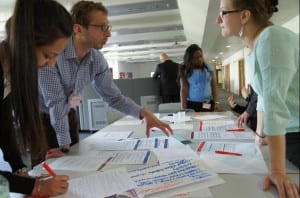George Monbiot’s recent article in The Guardian, “How a corporate cult captures and destroys our best graduates”, raised some interesting questions about graduate recruitment at the UK’s top universities. At UCL Careers we recognise not all organisations have equal resources, and that it is our responsibility to give non-profits, public sector organisations and SMEs every chance to promote their career opportunities to UCL students and graduates.
The article criticised several Russell Group universities and, although his researchers did not contact UCL and nor were we criticised in the article, we wanted to share what we are doing to ensure students and graduates find out about and have access to more than just City careers.
The article accused leading universities of passivity in the face of “love bombing” from large corporates, suggesting they should be doing more to counter this. UCL Careers devotes considerable time and resources to initiatives alerting students to alternative career options, and encouraging non corporates to come on to campus. Looking at our events this week, we are working with 23 employers on our Global Citizenship Employability Programme, of which 50% are charities, SMEs or public sector bodies, including Think Ahead (a graduate programme for mental health social work) Ark Schools (an educational charity) and Bartonia Care (a healthcare scheme for the elderly). Likewise, looking at the employers collaborating on our Focus on Management course, these include the Civil Service Fast Stream, Researchers in Schools and Repositive (an SME working for efficient and ethical access to genomic data), alongside several large corporates. Finally, just over 25% of the employers attending our Jobs Market, are from the public and charity sectors, or are SMEs.
We developed our themed weeks specifically to raise the profile of sectors such as Charities and NGOs, the Environment, and Museums and Cultural Heritage, and to place them on an equal footing with our Careers Fairs which feature more corporate career paths. Unlike our Fairs where organisations pay a substantial fee to attend, our themed weeks are completely free of charge for employers.
This year’s themed week programme comprised 26 individual events covering six sectors, and over 1,300 UCL students attended. They heard from expert speakers at organisations such as Amnesty International, Save the Children, the NHS Graduate Programme, the Institute of Conservation, the National Theatre, the V&A Museum, Global Alliance for Chronic Disease and the Stroke Association. Some weeks, such as Charities and NGOs, almost entirely featured SMEs, charities and public bodies, but even weeks such as Life and Health Sciences had representation from non corporates at every event.
The UCL Careers Twitter hashtag #uclinspireme highlights a range of career opportunities which UCL students and graduates may not be aware of- and where employers may not have the resource to promote them on campus. This includes a series of blogs written by people in less publicised graduate jobs including fashion PR, market research, and child safety, as well as highlighting less common vacancies such as “Epidemiology Intern”, “Content Marketing Executive”, and “Fundraising and Marketing Graduate Trainee”. Students can follow @uclcareers, or search for the hashtag #uclinspireme, to keep up to date with these.
We also make a great effort to involve charities and SMEs in our placements, internships and vacancy services. Smaller organisations are put off by fees to access university students, but are also often worried about attending high profile events and receiving huge numbers of applications, which they don’t have time to process. We set up our shortlisting service, UCL Talent Bank (which takes much of the legwork out of recruitment) specifically to engage smaller employers and bring their vacancies to UCL students’ and graduates’ attention. Since Talent Bank started, we have advertised around 175 roles for non corporates, including Rainforest Foundation UK, the Institute for Sustainability and homelessness charity Providence Row. Talent Bank is free of charge for employers.
Talent Bank is a service for all UCL students and graduates but we are also tasked with sourcing internships for specific courses at UCL, one of these is the BASc Arts and Sciences. Over the two years we have been working with these students around 65% of the internships they secured were with either SMEs or charities.
Finally, we often arrange for employers to visit departments to talk about relevant career opportunities. In two examples from this year, two panel discussions in the School of Public Policy involved representatives from Oxfam, VSO and Macmillan Cancer Support, while a recent panel event at the Institute of Education featured a large UK based charity, an international development organisation, the director of a small business and a self-employed consultant, the idea being to demonstrate to students the variety of the types of careers they could aspire to.
The Guardian article praised the Careers Service at the University of Cambridge for trying to “counter the influence of the richest employers”. It lauded their policy of imposing a fee on rich recruiters and using the proceeds to make it easier for non profits to recruit at the university. Almost all leading UK universities charge fees for recruitment services to larger organisations, and UCL is no exception. First and foremost, these fees have to represent good value for the companies who pay them or they won’t recruit here, and the many students who are interested in careers such as finance, law, consultancy, IT and engineering will miss out. That said, we consciously invest any surplus from these activities into services for all students, including the initiatives listed above.
We don’t believe our role is to make value judgements about particular career paths, and nor will we tell you that you should or shouldn’t pursue a particular job based on our own ethics. We do believe we have a responsibility to marry our knowledge of the many different careers UCL students pursue, with the availability and interest of particular employers when delivering our events and services. We hope this overview provides reassurance that we don’t just promote one type of career, but we are always interested in hearing from students and graduates if there are particular employers or sectors you want to see more of.
– Phil Howe, Employer Engagement and Business Development Manager, UCL Careers.
Filed under UCL Careers News, Uncategorized
Tags: careers fairs, Careers Service, charities, Employer Engagement, environment, George Monbiot, Goverment and Policy, Guardian, Health and Life Sciences, internships, Media, NGOs, Non-profit. Public Sector, placements, Response, SMEs, themed weeks, UCL Talent Bank, UCLInspireMe, vacancies
No Comments »
 Close
Close














